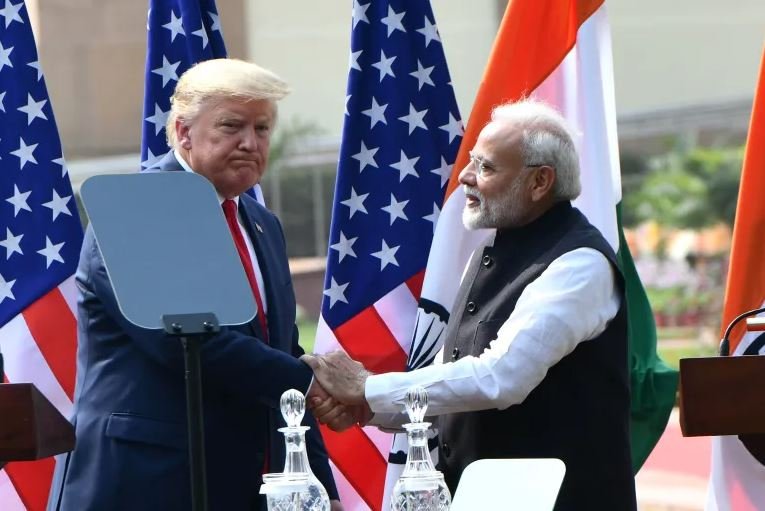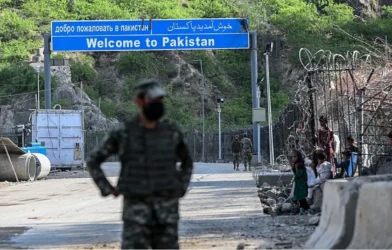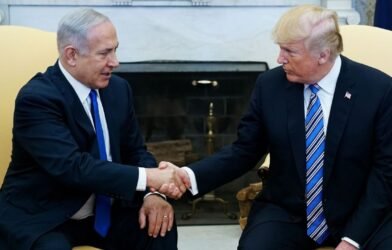Subtotal $0.00

India-U.S. relations intervene as Republican candidate wins Donald Trump In the presidential elections, a new phase may be filled with challenges and tangled alliances, but it could also see more consensus, given that the Indian Prime Minister Narendra ModiComing from a right-wing background, like the US president-elect.
and connect India BUnited States A strong strategic relationship, based on common interests and political alliances, but these relations carry with them thorny files and disagreements that give them a kind of fragility, especially in light of global political shifts and rising tensions with China.
Realization of gains
Trade disputes, minority issues, migration, and divergent attitudes toward the U.S.-New Delhi relationship are some of the key issues casting a shadow over the relationship between Washington and New Delhi. Russia andIranand India's position on Western alliances to contain Chinasuch as the Quadrilateral Security Dialogue (QUAD), which in addition to India includes the United States, Japan, and Australia.
Trump's tough policies on China, immigration and trade are expected to affect relations between the two countries, which could pose a challenge for New Delhi, which prefers to maintain a delicate balance in its relationship with China away from direct confrontation.
Trump's political positions can be extrapolated from his previous term in office. His behavior is governed by a set of principles, perhaps the most important of which are protecting American industry, stopping giving free services to others - as he says - and bringing production and industry back to the United States in order to generate jobs.
According to many observers, Trump's policies are not value-driven but rather based on achieving gains. He does not pay attention to many of the issues that Democrats consider part of their country's foreign policy principles, for example free trade, climate change, and the rights of minorities, women and LGBT people, issues that were an important element in the relationship between the democratic administration and others.

Fair Trade
During his official visit to India in February 2020, Trump stated that "India is a key strategic partner, especially in the face of Chinese challenges." During his official visit to India in February 2020, he stated that "India is a key strategic partner, especially in the face of Chinese challenges.
In bilateral summits between the two countries in 2019 and 2020, the Indian prime minister emphasized that "cooperation with the United States goes beyond bilateral issues to an alliance that promotes stability in the region." Despite these friendly statements, some Indian officials have warned that "Trump's economic orientation may make trade cooperation between the two sides more difficult."
US-India Strategic Partnership Forum President Mukesh Agahi said Trump's victory in a new term could lead to a focus on reducing the US trade deficit, noting that this could require India to make difficult concessions in trade negotiations.
Trade and immigration issues dominate the Indo-US relationship, and Trump is seeking to re-evaluate the trade advantages given to India due to its sensitive position in Asia and polarize it in favor of countering China.

As part of what he calls "fair trade," Trump said during his campaign that countries that benefit from the U.S. market and influence should pay for "parity," emphasizing the need to fix the trade deficit.
His statements suggest that he may impose more tariffs on Indian imports and take tough economic policies as he did in his first term.
A renewed approach in his new term means that privileges previously enjoyed by India will be reassessed, including additional restrictions on work visas for Indian immigrants. Trump recently emphasized the "need for more skilled labor," a concern in New Delhi, as there are about 5 million Indians in the United States, the largest Indian community outside the country.
The United States is a favorite destination for young Indians to study and work, and tightening measures could mean hurting this huge labor force, as New Delhi had hoped that the Indian presence there would be an entry point for future political influence in its favor.
However, Trump may work to grant India some concessions in this file, through what he called "useful labor and non-useful labor," by receiving trained and more qualified Indian workers who can serve in joints needed by the US economy, which makes it an issue that can be overcome, in addition to the issue of tariffs and trade imbalance, as the United States represents an important partner for India and this in itself is a reassuring thing in the context of the stability of the relationship between the two countries in the next phase.
Human rights
US official and human rights organizations have increasingly criticized India for the persecution of minorities, which has put increasing pressure on New Delhi and strained relations between the two countries, especially in light of the controversial Citizenship Amendment Act, which aims to facilitate the granting of citizenship to non-Muslims coming from Afghanistan, Pakistan and Bangladesh, an amendment approved in December 2019 to the Indian Citizenship Act of 1955.
According to this law, Hindu, Sikh, Buddhist, Jain, Parsi, and Christian faiths who arrived in India before December 31, 2014 can obtain Indian citizenship. Critics consider it discriminatory because it excludes Muslims from the beneficiary categories, contradicting the secular values enshrined in the Indian constitution.
US and international organizations have also expressed concern about the decline in press freedom in India. India has also faced criticism from the United States for what is described as a crackdown on political activists and human rights defenders, and criticism has focused on the use of draconian laws such as the National Security Act and the Unlawful Activities Act to detain dissidents.
In its annual human rights reports, the U.S. State Department has regularly addressed conditions in India, highlighting violations related to the treatment of minorities, especially Muslims, and issues of press freedom and freedom of expression.
In its 2022 report, the ministry cited "increased pressure on journalists and activists, arrests in Kashmir," and "troubling legislation on citizenship that excludes certain minorities."
Some members of Congress have also expressed concern about the human rights situation in India, and Democratic Representative Brett Sherman wrote a letter calling on India to review its citizenship policies, noting that they raise concerns about religious discrimination.
The United States, especially under Democratic administrations, has exerted diplomatic pressure on India to improve its human rights record, although this criticism is sometimes tempered by the strategic partnership between the two countries.
But Trump shows a clear indifference to human rights concerns compared to Democratic administrations. Issues such as religious freedoms or minority rights are not a priority for him, and he is accused of racism against Muslims and immigrants. On the contrary, his right-wing background is likely to make him more understanding of Indian policies in this area.

Facing China
The United States considers India a key partner in its strategy and efforts to contain Chinese influence, including Trump's statements that "India is an essential part of the US strategy to confront China," expecting New Delhi to take clear steps to support Washington-led alliances, but it is clear that India is trying to avoid getting involved in a direct clash with Beijing by strengthening its trade and diplomatic relations with China and following a balanced policy to maintain the stability of the Indo-Pacific region.
Trump has made it clear that "confronting China requires strong alliances in the Asian region, and India plays a pivotal role in this alliance." This idea was clearly stated during his visit to India in February 2020, at a rally in the presence of Indian Prime Minister Narendra Modi, which reinforces the importance of the Quadrilateral Security Dialogue (QUAD) between India, America, Japan and Australia.
Although New Delhi is a key member of the Quadrilateral Alliance, it tends to present it as a hybrid alliance that is not based solely on the military aspect, by raising humanitarian issues such as health and technology, in an attempt to soften the grouping and make it more palatable, something that Trump and his Republican administration will not accept, as they could see it as a way to dilute the identity and goals of the grouping.
Trump is expected to make changes to this approach and demand that India strengthen the military aspect of the alliance and make more specific and explicit commitments in this regard, which may pose a challenge to New Delhi, which prefers to maintain a delicate balance in its relationship with China, especially since bilateral trade between the two countries is developing despite border disputes.
If India has not signed the Asian Infrastructure Investment Bank (AIIB) agreement, which is the main artery of the Belt and Road (China's BRI has 110 member countries, meaning it is not part of the initiative, but its trade with China is developing, indicating that it is trying to create a safety net in its relationship with Beijing without relying entirely on the United States.
The logic of U.S. confrontation with China is not necessarily inevitable, although it is likely, as Trump has praised the Chinese president Xi Jinping On several occasions, including his remarks at the World Economic Forum in Davos on January 21, 2020, where he praised his personal relationship with Xi, noting that they "like each other," despite trade tensions between the two countries.
In an interview with Joe Rogan in 2024, Trump described Xi as a "brilliant man" and a "leader with an iron fist," emphasizing his respect for his abilities to manage a huge country like China, and the two sides have high pragmatic approaches in which deals between the two sides are not excluded, especially in light of Trump's stated policy of staying away from starting wars.
Trump has a rivalry with the military-industrial complex in the United States, so he relies on a strategy of resolving conflicts quietly without military intervention. He is concerned with ending the Ukrainian war as he has repeatedly declared, and it is unlikely that he will go to a state of military confrontation with China over Taiwan, but on the contrary, he may seek to cool the relationship between them as was the case previously with North KoreaThis may also include the issue of the South China Sea.
Russia and Iran
India maintains close historical relations with both Russia and Iran, and these relations represent an additional dimension to Indo-US relations, as Trump may deal more flexibly with the Russia file, as he had previously said in a speech at the American Economic Club in New York City on September 5, 2024, "He seeks to end the conflict in Ukraine and return Russia to the international community." This gives New Delhi a wider margin to strengthen its relations with Russia without great pressure from Washington.
As Trump emphasizes his priority to develop the US economy, he may turn a blind eye to India's rapprochement with Iran, especially if it serves common economic goals, but US officials have emphasized that "India's relationship with Iran will remain a sensitive factor in US policies," raising questions about how the Trump administration will address this thorny issue.
Despite potential disagreements, the relationship between India and the US is driven by shared strategic interests, most notably countering China's rise and promoting cooperation in technology, renewable energy, and economics.
Some priorities are expected to undergo changes under Trump, with the possibility of increased trade pressures and a reassessment of immigration policies. However, it seems that the relationship between the two countries will continue to balance common interests and political tensions.
Given Trump's personal style of developing relations during his previous term, relations with India are likely to be characterized by a degree of harmony, especially given the similarities between the personalities of Trump and Modi; both come from a right-wing background, which may contribute to finding commonalities that promote understanding between them.











